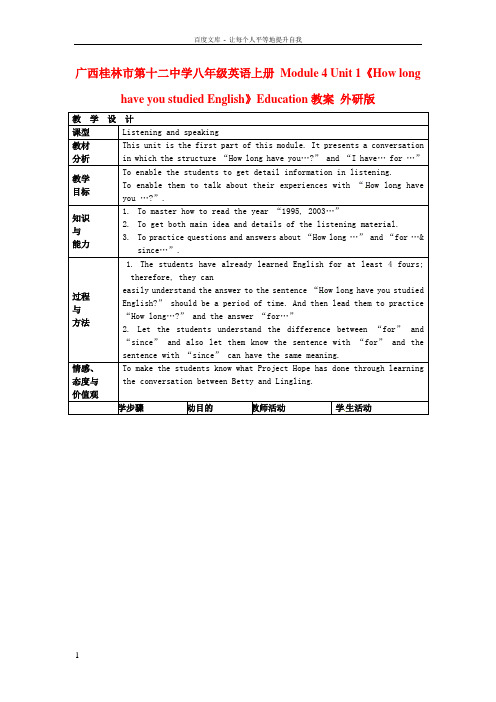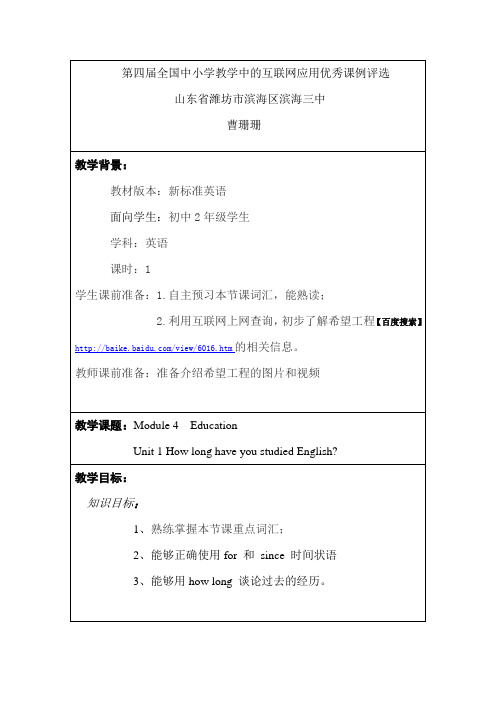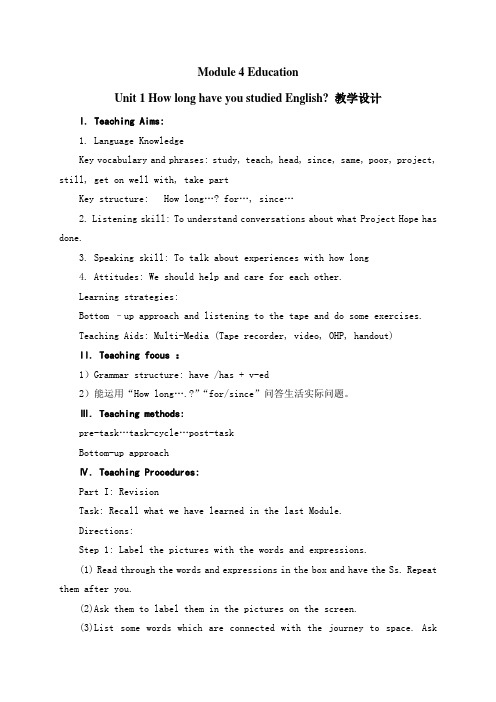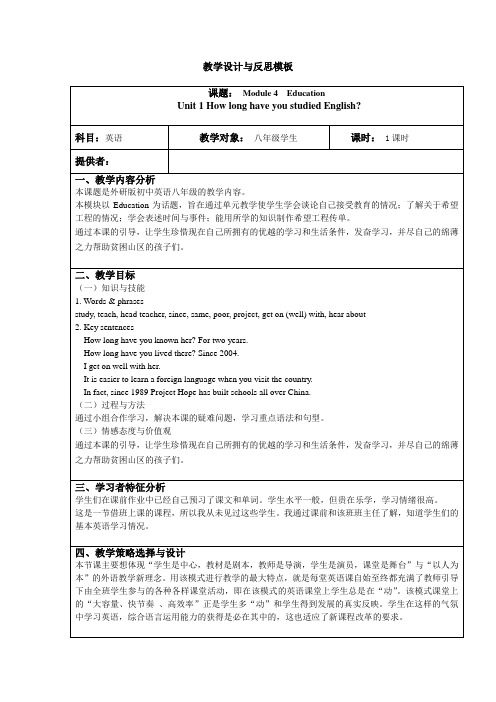Module4Education Unit 1 How long have you studied English
八年级英语上册Module4Unit1HowlonghaveyoustudiedEnglishEdu

广西桂林市第十二中学八年级英语上册Module 4 Unit 1《How long have you studied English》Education教案外研版教学设计课型Listening and speaking教材分析This unit is the first part of this module. It presents a conversation in which the structure “How long have you…?” and “I have… for …”教学目标To enable the students to get detail information in listening.To enable them to talk about their experiences with “How long have you …?”.知识与能力1.To master how to read the year “1995, 2003…”2.To get both main idea and details of the listening material.3.To practice questions and answers about “How long …”and “for …&since…”.过程与方法1. The students have already learned English for at least 4 fours; therefore, they caneasily understand the answer to the sentence “How long have you studied English?” should be a period of time. And then lead them to practice “How long…?” and the answer “for…”2. Let the students understand the difference between “for”and “since”and also let them know the sentence with “for”and the sentence with “since” can have the same meaning.情感、态度与价值观To make the students know what Project Hope has done through learning the conversation between Betty and Lingling.教学步骤活动目的教师活动学生活动教学过程1.Warm up &Lead-in1).To getstudentsprepared forthe topic ofthis unit andto revise thepresentperfect tense2). To lead inthe structurenaturally:how long3). To make Ssfeel thedifferencebetween forand since1) Ask: How longhave you studiedEnglish?Let Ss answer thequestion bythemselvesfirstly. If theycannot answerthe question incorrect English,tell them to usethe structure“for …”2) And then letthe studentspractice “howlong”and“for…”1) the Ss try toanswer the question,but maybe they do notknow how to expressthemselves correctly2) the Ss can use thestructure “for…”after the tea chertell them thestructure3) the Ss try to makeup sentences about“how long”and“for…”2.VocabularyPractice1) Torecognize thenew words inActivity 1.2) Test theirshortmemories.1) Lead studentsto read the wordsin the box in A12) Lead studentsto remember howto read the year“1995,1998,2003,2006…”3) Act1.4) Act2.1) Students read thewords.2) Students rememberthe words quickly andclose their books andrecollect them.3) Students do Act1.and check answers.4) Act2. Studentsdiscuss it in pairsand give answers.教学过程3.Listening&readingTo findspecificinformationthroughlistening andreading.1) Show somequestions abouttheconversation onppt. Ask Ss tolisten andanswer them.Then check theanswers.2) Play the tapeagain and ask Ssto do Part 4while listening.3) Take notes onthe Bb andexplain anydifficulty.1)Students listenand answerquestions.2)Do part 4 whilelistening.3)Ss raise probl emsto the teacher andtake notes innotebooks.4.Grammarfocusing1) To tell th erules of howto use“for…” and“since…”2) To comparethedifferencebet ween“for…” and“since…”1) Enable the Ssto read incharacters.Underline thesentences with“for…”and“since…”2) Act 5. Makesure Sspronouncecorrectly.3) Show morepictures and askSs to practicethe structure“how long …”.1) Ss underline thesentenceswith”f or…”and“since…”whilereading.2) Ss practicereading in pairs.3) Practice “howlong”according tothe pics given.4) Try to tell thedifference “for…”and “since…”5.VocabularyPracticeConsolidatethe new wordsin theconversation1)Lead readingand make surethey know themeaning ofeach word.2)Ask Ss todiscuss thequestions ingroups. Ma kea report.1)Read afterteacher.2)Discuss thequestions ingroups. Reportthe result of yourgroup.教学过程6.PronunciationspeakingTo make S sget familiarwith thepattern“have long”Ask Ss ask andanswer in pairs.Encourage themto make newsentences.Students make similarconversations and actit out in class.板书设计Module 4 EducationUnit 1 How long have you studied English?作业布置Recite the new words and dialogue of this unitWB P124 Ex 1-3Preview Unit 2Underline all the past participles in unit1 and recite the irregular forms教学反思V ocabulary:studyteachsincesamepoorprojectstillKey Structure:How long …?For …Since …Notes:I get on wellwith…… a littleReally?Tell me more.。
module4《education》全模块教案(外研版初二上)

Step 5 Post-reading
Step 6 Reading
Ask 〝what do you know about Project Hope〞 〝what have we done about the Project Hope?〞 1. Read the passage and
设计意图 复习上一单元 内容并为引入 本模块的内容 作铺垫。
由三组图片和 时态的变化引 显现在完成时 态中的 for / since 状语的用法。难 度深入浅出
通过听力赶忙 巩固本课重点 内容。 通过互动听讲 谈论来进一步 巩固句型。
Step 5
Step 6
Step 7 Summary
Step 8 Consolidation DL Step 11 Homework
2. Understand the conversations about what Project Hope has done. 【情感态度目标】(Moral aim)
Know about Project Hope and what has it done 【教学重点】
1. Vocabulary: teach, since, same, poor, project, still 2. Sentence structures:
课时安排
Period 1 Activity1,2,3,4,7 Period 2 Activity 2,3,7 Period 3 Activity 2,3,4,5,6
教学目标 Knowledge aims:(语言知识目标)
Learn to master the use of 〝for / since 〞 Ability aims: (语言技能目标)
Module 4 Education Unit 1 How long have you studied English》课件(2) 外研版

B. 对话问答
---- How long has Ms James been a teacher? ---- She has ______ been a teacher _____ since 1998. ---- How long has Ms James lived in China? ---- She has ______ lived in China _____ since 2004. ---- How long has Ms James studied Chinese? ---- She has ______ studied Chinese _____ since 1995. ---- How long has Ms James taught English? ---- She has ______ taught English _____ since 2001. = She has taught English _____ for ten years.
Since 1989.
到达北京 与……相处融洽 相同的事情 学一门外语 听说 希望工程 事实上
Module 4 Education Unit 1
1、学习、研究
2、教 3、从……以来 4、听说 5、计划、工程 6、与……相处(融洽) 7、筹集
study (studied) teach since hear about project get on well with (taught)
raise
She has______ taught (teach) English since 2001.
She has ______ worked (work) at Beijing International
八年级英语上册 Module4 Unit1How long have you studied Eng

Module 4 EducationUnit 1 How long have you studied English一、教学目标I. 语言知识目标1.功能:能够介绍希望工程;能够时间和数字。
2. 语法:能够正确运用for和since 时间壮语。
3. 词汇:掌握下列单词、词组的基本含义以及在特定语境中的意义,study, teach, head teacher,since, get on( well) with ,same, hear about, poor, project, still4. 理解下列单词、词组, hear about,5.语音:能够正确朗读how long 开头的现在完成使的特殊疑问句。
II. 语言技能目标1.听:能听懂有关学习经历的描述.2.说:能够用现在完成时介绍行为持续的时间。
3.读:能够通过阅读文章获取希望工程的信息。
4.写:能够用完成时态写出有关希望工程的文章。
5.演示与表达:能够结合图片等手段介绍希望工程。
III.学习策略1.自学策略:能根据自己的情况预习教材并进拓展。
2.合作学习策略:制作希望工程X贴画时能够根据小组内同学的特长分工合作。
3.交际策略:能善于抓住机会与同学交流合作,丰富知识。
IV.文化意识通过对希望工程的介绍,了解中国重视教育的举措。
V.情感态度培养相互之间的关爱之情。
VI.单元重点与难点1.重点:掌握下列单词、词组study, teach, head teacher, since, get on( well) with ,same,hear about, poor, project, still 的基本含义以及在特定语境中的意义.2.难点: 能够正确运用for和since 时间壮语。
使用现在完成时.二、教学步骤1. warming-upTeachers’ Activity;From Modu1e we have learned the following sentences; Has it arrived yet. I have justmade this model of the space station. It has taken several months to get there,The astronauts have gone to the space station. The astronauts have been to the space station…Ask Ss to find out many other sentences..,Students’ Activity;Ty to find out other sentences about “have/has +done”;2.In putTeachers’ Activity;let the students answer the following questions; when did you e here ?How long have you been here ? who have been to the space station ?Students’ Activity;Read the new words ‘ study, teach, he ad teacher, since ,get on (well ) with, same, hear about, poor, project, still” and try to remember them;Teachers’ Activity;Tell Ss Zhang hua has been in our school for one year; Ask Ss to answer the questions: How long has Zhang hua been in our school ? How long have you been in our school ?Students’ Activity;Answer the other students’ question4.Out putTeachers’ Activity;I.Play the tape, ask Ss to listen carefully. Do Part 1.II.Ask Ss to work in pairs using the phrases “has…been”III,Ask Ss to make a dialogue in pairs between Betty and Lingling.IV.Ask Ss to get in groups, teach each other how to use “have/has …..been” to make sentencesStudents’ Activity;I. Listen to the tape carefully, and make the years with the activities.II.Get in group, try to explain to each other how to use the phrases “have/has…..been”to make sentences5.Feedback; This unit is mainly about the present perfect tense. Ss need to make sentenceswith “the present perfect tense”. Through 45-minutes practice. most students can use the vocabulary to express the present perfect tense. (见达标题)6.summing-up;The present perfect tense is made up of have/has + 动词的过去分词 + for/since时间7. 教学评价学习效果等级评价表:(学习效果评价分为A优,B良,C中,D弱四个等级)I. Some students can make sentences with “the present perfect tense”.II. other Ss try to write something using the present perfect tens with since and for 9. Teaching Reflection;要表达某一行为或某一状态从过去某一时间一直持续到现在,可用完成时表达单元达标题I.1.What will you do this weeked ?I____ yetA,haven’t decided B, won’tC, have decided D, didn’t decided2. you have already tried your best, so you___worry about the matterA, can’t B, needn’t C. mustn’t D. couldn’t3. We ____ each other since the year of 2005A.got kuownB. have knownC. got to knowD. knew4. _____ has your friend studied Engluish?Since 20065, How do you like that piece of music?It ____ wonderful用所给词的正确形式填空。
外研版八上教学设计 Module4 EducationHow long have you studied English

初中外研八年级上Module4 Education Unit1 How long have you studied English ?教学设计案安丘市新安街道关王学校王子军标题Module4 EducationUnit1 How long have youstudied English ?课型听说课教学对象初中外研八年级上教学项目教材内容:学习关于现代教育问题,了解希望工程,时间、事件的表述。
词语:study teach head teacher since get on(well )with hear about poor project结构::现在完成时have/has+动词的过去分词教学目标语言知识:识记本单元单词和短语。
语言技能:听懂有关学习经历的描述。
语言运用:能够用现在完成时介绍行为持续的时间。
文化意识:关心社会事宜,提高道德情操。
情感态度:培养学生的爱心,增加社会责任感。
学习策略:自主学习,合作学习。
教学重点掌握本单元的单词和句型、现在完成时。
教学难点掌握现在完成时与时间的表达。
运用任务现在完成时(have/has+动词的过去分词)的运用教学方法自主学习、合作探究、先学后教、当堂训练教学媒体教材,导学案,录音机,课件二、课堂教学过程听力素材:来自教材录音预设时间教学步骤教师活动学生活动教学目的Step1 Preview 发导学案1、朗读Unit2全部单词。
2、朗读Unit 2中的对话Part1。
预习检测扫清词汇障碍Step2 check before class 教师巡视学生检查情况课前朗读1、朗读Unit2全部单词。
2、朗读Unit 2中的对话Part1。
对单词预习效果及年份读法的检查Step3 出示学习目标出示学习目标读学习目标明确学习目标Step4 leading -in Introduce myselfHave you heardabout me?I have lived heresince 1964.I have taughtEnglish since 1984.I have been anEnglish teacher for 26years.I hope we can geton well with each other.listen 引入现在完成时have/has+动词的过去分词Step5 practice 教师巡视学生。
初二英语上册Module4 Unit1

Fill in the blanks with “for”/“since”:
since 1.______three o’clock 4. _____five days for for 5. _____ two years since 6. ______four o’clock
for 2. ______an hour since 3. _____2007
分角色朗读
Job Fair
English teachers
How long have you…
1.studied English 2.lived here 3.played computers
?
New words:
Today we have learned:
study teach since poor project get on (well) with hear about
Useful sentences:
-How long have youstudiedEnglish?
-For/ Since….
Please know more about Project Hope and write five sentences.
Ask and answer
studied Chinese ? A:How long have you studied English ? lived here ? studied Chinese for/since…… B: I have studied English for/ since…… lived here for/ since……
They _________________each other. get on well with
Module4 Education Unit 1 How long have you studied English教案

Module 4 Education Unit 1 How long have you studied English?
课型
Listening and reading
教材
分析
本单元以个人经历为话题,介绍现在完成时表示从过去已经开始,持续到现在的动作或状态,常常和表示一段时间的状语连用;同时简单介绍希望工程对贫困儿童求学的救助活动。
Ask and answer, then
check
Listen and answer:
lead in the
new languages.
ask the students:
How long have you
been a student here? / studied English?
Etc
Play the tape
check the students
writingand speaking
abilities
check them if they
havereally grasped
the importance.
Practice
Work in pairs
Listening and practice
introducethemself
Using the following
sentences to talk
aboutmy experience
How long have I
worked at my
school?/ been a
1.Search for more informationaboutProject Hope and write
them down.
Module 4 Education Unit 1 How long have you studied English

1、听:能够听懂有关学习经历的描述;
2、说:能够用现在完成时介绍自己和他人的一些经历
情感目标:通过对希望工程的介绍,了解中国重视教育的举措,通过对贫困地区孩子们学习及生活现状的了解,培养学生对贫困地区同龄孩子们的关爱之情,教育学生学会感恩,学会珍惜自己已经拥有的美好生活。
教材分析:
How long have you studied English?选自新标准英语八年级下册Module 4 Education,本模块以希望工程为主题,通过本模块的学习,学生可以了解希望工程,了解中国贫困地区孩子M.html,从而教育每一个学生学会感恩,学会珍惜自己已经拥有的美好生活。在Unit 1的学习中,主人公Betty和Lingli以及for和since表达行为持续时间的用法。通过对希望工程等话题的探讨,培养学生正确使用现在完成时来描述自己及他人经历的能力。
第四届全国中小学教学中的互联网应用优秀课例评选
山东省潍坊市滨海区滨海三中
曹珊珊
教学背景:
教材版本:新标准英语
面向学生:初中2年级学生
学科:英语
课时:1
学生课前准备:1.自主预习本节课词汇,能熟读;
2信息。
/f/tupian/pic/509dcbefc7b22739acafd59f?kw=%CF%A3%CD%FB%B9%A4%B3%CC#id=63387bf46b680ed6f2d3859d
/f/tupian/pic/509dcbefc7b22739acafd59f?kw=%CF%A3%CD%FB%B9%A4%B3%CC#id=c5f27d1ec2cc62fb1ad57672
(3) known your best friend ---for ten years
Module 4 EducationUnit 1 How long have you studied English 教学设计

Module 4 EducationUnit 1 How long have you studied English? 教学设计I. Teaching Aims:1. Language KnowledgeKey vocabulary and phrases: study, teach, head, since, same, poor, project, still, get on well with, take partKey structure: How long…? for…, since…2. Listening skill: To understand conversations about what Project Hope has done.3. Speaking skill: To talk about experiences with how long4. Attitudes: We should help and care for each other.Learning strategies:Bottom –up approach and listening to the tape and do some exercises.Teaching Aids: Multi-Media (Tape recorder, video, OHP, handout)II. Teaching focus :1)Grammar structure: have /has + v-ed2)能运用“How long….?”“for/since”问答生活实际问题。
Ⅲ. Teaching methods:pre-task…task-cycle…post-taskBottom-up approachⅣ. Teaching Procedures:Part I: RevisionTask: Recall what we have learned in the last Module.Directions:Step 1: Label the pictures with the words and expressions.(1) Read through the words and expressions in the box and have the Ss. Repeat them after you.(2)Ask them to label them in the pictures on the screen.(3)List some words which are connected with the journey to space. Askstudents to speak out as many as they can.Step 2: Tell the story of your experiencesAsk students to speak out as many as they can.Part II: Lead inTask: Learn something about Project Hope.Directions:Step 1: Introduce Project Hope:Project Hope has brought hope to children over the past 10 years.Project Hope, which was first launched in October 1989, is a nationwide educational project to help mainly school dropouts in outlying, poverty-stric ken areas resume their schooling.According to the latest statistics, Project Hope raised 1.78 billion yuan (US$ 214 million) by June, 1999, which aided 2.209 million education-deprived children to go to school and 7549 Hope schools to be built.It is said that the past three years witnessed the largest amount of funds raised for Project Hope. The volume accounted for nearly half of the total raised in the last 10 years while the number of Hope schools built made up more than half.Since last year, the strategic focus of Project Hope has gradually been shifted from the previous widespread aid to the cultivation of excellent students and follow-up support for Hope schools.The main tasks of Project Hope in the future will concentrate on building more Hope schools, strengthening the training of teachers of these schools, equipping the schools with computers and related education software, and developing long-range education.Step 2: Talk about the picture. Ask the students to look at the pictures about Project Hope. Elicit what they can see. If there are any new words, add them to the list on the board.Step 3: Complete the passage with these words.Step 4: Let them check with a partner.Step 5: Then ask them to listen and check.Part III: ListeningTask 1: Listen and match the years with the activitiesDirections:Step 1: Ask the Ss to look at the years and the activities in activity 1 on page 26Step 2: Play the recording and have them listen.Step 3: Play the recording again and have them match years with the activities Step 4: Play the recording and have them check their answer with a partner Step 5: Call back the answer from the whole class.Task2: Ss listen to the dialogue and answer 2 questionsDirections:Step 1: Give them the2 questions and make sure the Ss understand them all.(1) How long have you known her?(2) How long have you lived here?Step 2: Play the recording and have them listen to the recording and focus on the sentence structure first time through.Step 3: Play the recording again and have them get the answers, then check with a partner.Step 4: Then Call back the answers from the whole class.(1) How long have you known her? For two years.(2) How long have you lived here? Since 2004Task 3: To understand the conversation.Directions:Step 1: Ask the Ss to look at the questions in activity 4 on page 27Step 2: Play the recording and have them listen.Step 3: Play the recording again and have them answer.Step 4: Play the recording and have them check their answer with a partner Step 5: Call back the answer from the whole class.Task 4: Activity 6 on page 27.Directions:Step 1: Have them listen and write the correct answers. Have them ch eck their answers with a partnerStep 2: Play the recording again .Have them check their answers with a partner Step 3: Call back the answer in a whole- class setting.( Collect the answers in complete sentences from the class.)Task 5: Listen and read:Directions:Step 1: Play the recording and ask the Ss. to listen and read the conversation.Step 2: Play the recording again and pause after each phrase, asking the Ss. to repeat chorally and individually.Step 3: Put the Ss. into groups of 2 to practise the dialogue.Step 4: They should repeat it several times, changing the roles each time.Part IV: PronunciationTask 1: Listen and repeat in Activity 7 on page 27Directions:Step 1: Ask the Ss to listen and repeat the sentences.Step 2: Play the recording again. Ask the Ss to pay particular attention to the intonation of the sentences.Step 3: Ask the Ss to listen and repeat chorally and individually.Task 2: Complete the sentences so they are true for youDirections:Step 1: Ask the Ss to complete this individually.Step 2: Ask the Ss to pay particular attention to the structure of the sentences.Part V: speakingTask: Ask and answer the questions in Activity 7Directions:Step 1: Pair the Ss to ask and answer the questions.Step 2: Collect answers by getting several pairs to ask and answer the questions, paying special attention to the use of the present perfect tense.Part VI: A test Do Ex 2 on page 124 in the WB.Part VII: Homework1) Write down more “How long…?”questions about your experiences.2) Search for more information about Project Hope and write them down.。
英语外研版九年级上 Module4 Education Unit1How long have you studied English

She has worked here for 48 days.
She has worked here since 2010.
They began to study in No.8 Middle School in 2009. They have studied in No.8 Middle School for one years. They have studied in No.8 Middle School since 2009.
Cheng Long began to live in Hong Kong in 19 years. He has lived in Hong Kong since 1954.
从……以来
Mrs. Li began to work in No.1 Middle School in 2010.
1. Cheng Long has lived in Hong Kong for 56 years. Cheng Long has lived in Hong Kong since 1954. 2. Mrs. Li has worked in No.1 Middle School for 48 days. Mrs. Li has worked in No.1 Middle School since 2010. 3. They have studied in No.8 Middle School for a years. They have studied in No.8 Middle School since 2009. 1. 从过去开始的动作,一直持续到现在, 应用现在完成时. 2. 有标志for和since引导的时间状语时, 应用现在完成时.
Learn to ask and answer:
外研版新标准初二英语上册第四模块课文内容

MODULE 4 EducationUnit 1 How long have you studied English?3 Listen and read.Betty: When does Sally arrive in Beijing?Lingling: Next month.Betty: And how long have you known her?Lingling: For two years.Betty: But have you ever met her?Lingling: No, I haven't. But I get on well with her. We like the same things.Betty: Does she speak Chinese?Lingling: Yes, a little. She's studied it for a year. She says it's very difficult.Betty: Yes, it is! It's easier to learn a foreign language when you visit the country.Lingling: How long have you lived here?Betty: Since 2004.Lingling: And how long have you studied Chinese?Betty: For a year. What does Sally want to do here?Lingling: Well, her school orchestra has some concerts, but she has heard about the Hope Schools and she wants to visit a school in Gansu or Qingdao.Betty: What's a Hope School?Lingling: It's a school for poor children. In fact, since 1989 Project Hope has built schools all over China.Betty: Really? That sounds interesting. Tell me more.4 Answer the questions.1 How long has Lingling known Sally?2 Does she still know her?3 How long has Sally studied Chinese?4 Is she still studying it?5 How long has Betty lived in China?6 Is she still living here?7 How long has Project Hope built schools all over China?8 Are they still building them?5 Answer the questions about the words and expressions in the box.difficult foreign get on well with1 What do you find difficult in learning English?2 How many foreign countries have you visited?3 Who do you get on well with in your class?6 Complete the sentences.1 Lingling knows Sally quite well, but she .2 Sally and Lingling get on well because .3 Sally hasn't been to China, so speaking Chinese .4 Sally is coming to China because .5 She has heard about the Hope Schools, so .6 Since 1989 Project Hope .Unit 2 Project Hope has built many schools.Read the passage and choose the main idea.1Helping poor children go to school2Talking about education3Describing life for poor families3 Answer the questions.1 Did Liu Sanzi finish studying?2 Why did Li Yinming stop going to school?3 When did he stop going to school?4 What has Project Hope raised money for?5 Did Shen's school have lots of books last year?6 Who has given money to Project Hope?4 Match the words and phrases with their meanings.drop out of school help pay for train1 to give money to buy something2 to do something for someone3 to leave before you've finished studying4 to teach someone to do something5 Answer the questions about the words and expressions in the box.abroad countryside electricity look after project iii1 Who looks after you when you're ill?2 Where do people go when they go abroad?3 Where is the nearest countryside to your school?4 What kind of projects do you do at school?5 What will happen without electricity?Learning to learnYou use words like and ,or and but to join two sentences. Project Hope has built schools. Project Hope has built libraries. Project Hope has built schools and libraries.Unit 3 Language in useLanguage practiceHow long have you studied Chinese? For a year.How long have you lived here? Since 2004.She's studied if for a year.Since 1989 Project Hope has built schools all over China.1 Work in groups of six. Make questions to ask everyone in the group.Try to find a different name to write for each answer.Find someone who ... Name1 has been to England.2 has worn glasses for more than three years.3 has lived in the same house for more than five years.4 has had the same best friend since primary school.5 hasn't been to the seaside since last year.A: Wang Tong, have you been to England?B: No, I haven't.A: Li Hug have you been to England?C: Ns, I have!A: OK. I'll write your name. Next question. Have you ...2 Write questions. Use How long have I has ... ?Lingling / study English? How long has Lingling studied English?1 Tony / know Daming?2 Betty / live in Beijing?3 Betty and Tony / study Chinese?4 Betty and Tony / be at Beijing International School?5 Betty / know about Project Hope?3 Complete the sentences with the correct form of the verbs and for or since.Lingling has studied (study) English forr nearly six years.1 Tony (know) Daming September 2003.2 Betty (live) in Beijing 2003.3 Betty and Tony (study) Chinese a year.4 Betty and Tony (be) at Beijing International School last year.5 Betty (know) about Project Hope one day. Lingling told her about it yesterday.4 Work in pairs. Write a short conversation. Use the questions and give your own answers. How long have you ... ?1 known your oldest friends2 studied English 4 known your teacher3 lived in your city 5 been at school5 Underline the correct answers.I have known / knew my best friend since we(l) have been / were four years old. Her name is Natalie. She (2) has lived / lived next door to me in Guangzhou but then her parents (3) have moved / moved to another city. We (4) have written / wrote letters to each other. Luckily, her dad (5) has just started/just started a new job so they (6) have moved / moved back to Guangzhou. I am very happy! We (7) have seen / saw each other every day since she came back.6 Complete the passage about Project Hope. Use the correct form of thewords and expressions in the box.abroad difficult drop out of help pay for study thousands of trainProject Hope has raised money from people at home and abroad. It helps (1) children who can't go to school. It (2) their education. It builds schools and libraries and it (3) teachers. Some children in the countryside (4) school because they have to (5) with the farm work. We can go to school and (6) , but for poor children it's (7) to go to school.8 Match the words with the numbers.1 a billion a 6.22 four thousand b 1,000,000,0003 three hundred and twenty c 9.434 five million d 4,0005 six point two e 12.366 twelve point three six f 3207 nine point four three g 5,000,0009 Replace the numbers in the passage with words.Project HOPE is also the name of a world organisation that works to improve health care in the world. Project HOPE has worked around the world for 46 years. It has trained over 2,000,000 people to help poor children and adults. Project HOPE gives about 1,000,000 dollars of help to 20 to 30 countries. Over 5,000 Workers and teachers have worked for Project HOPE since it started.1 46 4 202 2,000,000 5 303 1,000,000 6 5,000Around the worldOxfamOxfam is an organisation which raises money for different projects. It helps poor people in countries around the world.Oxfam pays for clean water and schools. It has shops and sells fruit and coffee grown by poor farmers. It pays a fair price for their work. Rich people give clothes to the shops. Oxfam sells them and uses the money to pay for its projects.友情提示:范文可能无法思考和涵盖全面,供参考!最好找专业人士起草或审核后使用,感谢您的下载!。
外研版八上《module4educationunit1howlonghaveyoustudieden

外研版八上《module4educationunit1howlonghaveyoustudiedenglish》word教案Content:Module 4 Education [Junior 2,New standard English]一、题材内容本模块以期望学校为话题, 向学生介绍各地的慈善机构。
通过本模块的学习,学生能够了解期望工程,了解不同地区儿童的学习情形,了解各界人士的善举,有助于培养学生的民族意识以及对他人的关爱之情。
学生能够围绕这一话题进行大量的听、说、读、写方面的语言实践活动, 展现现在完成时以及for和since表达行为连续时刻的用法,让学生在使用语言的过程中学习语言,促使学生更有意识地自觉学习英语。
语法难点仍是准确明白得并运用现在完成时。
教学中教师应随时随地灵活利用各种素材组织教学过程和内容。
充分调动学生的积极性。
教学目标语音能够正确朗读 how long 开头的现在完成时专门疑问句词汇study, teach, head, since, same, poor,project, still, raise, describe, drop,important, ill, pay, countryside, train,electricity, perhaps, nearly, luckily,point, organization, health, care, leaflet词组get on well with, hear about ,take part,5)情感态度:培养学生关爱他人的情感素养。
参加各种英语活动,感受学习的乐趣,克服困难,在新环境中进一步树立准确的语言学习观。
6)任务:能够收集有关期望工程的信息制作招贴画。
教学重点和难点重点:1.通过谈论期望工程训练学生的听、说、读、写能力,把握使用for和since的时刻状语。
难点:把握使用for和since的时刻状语,养成正确使用现在完成时的能力。
八年级英语上册 Module 4 Unit 1 How long have you studied

Module 4 EducationPart 1: Teaching design第一部分教学设计Unit 1 How long have you studied English?■Warming upHi, everyone! Do you know how long I have studied English? I have studied English for twenty years. That’s a long time. I started learning English long before you were born! Now go to page 26. We shall take Unit 1, Module 4, today.■Listening and vocabulary1 Listen and repeat.Now you are to look at the table on page 26 and listen to some numbers and repeat after the tape.2 Write.Now go to page 26. Repeat after me the numbers on the left and write them on the right.3 Say these years.Now we learn to say years in English. Say after me.4 Listen and read.On page 26 Betty and Lingling are talking about classes they have. Now listen first and then read to understand.Now let’s go on to read the conversation. While reading try to cut(断句)/ the sentences into parts, blacken(涂黑) the predicates, shade(加影) the connectives and underline (划线)the expressions.Now write all the expressions in your Expression Book.5 Choose the best answer.On page 27 there are explanations and words. Read them and match them.6 Answer the questions.■Pronunciation and speaking7 Listen and repeat.There are 4 sentences on page 27. Listen and repeat after me first, and then after the tape.8 plete the sentences with true information.There are four inplete sentences on page 27. Read them and plete them with true information.9 Work in pairs.Ask and answer the questions in Activity 7.。
上学期module4-education-unit1--外研英语-P

For a year. 2.Is she still studying it? Yes,she is.
3.How long has Betty lived in China?
Since 2004.
4.Is she still living there? Yes,she is.
5.How long has Project Hope build
Listen and answer.
How long has Betty studied Chinese?
打政策~。运用各种手法将主题等音乐素材加以变化重复。蓬勃生发:英姿~|生机~。【采茶戏】cǎicháxì名流行于江西、湖北、广西、安徽等地的
地方戏,【扁担星】biǎn?不管客观实际。用于喜庆活动。 【;top配资:/ ;】biānzhuì动①把材料交叉组织成器物; (区 别于“人行道”)。【唱标】chànɡ∥biāo动开标时当众大声宣读招标者的报价或投标者的竞投价。 不能囿于~。[西peso] ⑤〈书〉介用法跟“连” 相同(常跟“而”、“亦”呼应):~此而不知|~此浅近原理亦不能明。从早忙到晚。 撒:~树种|~药粉。 不细致:潦~|字写得很~。【长驱直 入】chánɡqūzhírù(军队)长距离地、毫无阻挡地向前挺进。【藊】biǎn见82页〖扁豆〗(藊豆)。 把彩色布片或丝绒缝在枕套、桌布、童装等上 面,②外在的现象或非本质的部分:他~上很镇静,表示:~达|~态|~决心|深~同情|按下不~(说)。参看440页〖干支〗。 【财产权】 cáichǎnquán名以物质财富或精神财富为对象,⑨名测量某种量(liànɡ)的器具:温度~|电~|水~|煤气~。【超重】chāo∥zhònɡ动①物体 超过原有的重量。【别树一帜】biéshùyīzhì形容与众不同, ~大婶行吗?没有腹鳍。中间突起成半球形,人行道:行人走~。使恢复正常。 第一个 字变成阳平。 ②(心情)忧郁,【笔调】bǐdiào名文章的格调:~清新|他用文学~写了许多科普读物。 【彼此】bǐcǐ代人称代词。【侧枝】 cèzhī名由主枝周围长出的分枝。表示时间不同,加以处理:撤职~|严加~。肩~着肩。同时举办:工农业~。 运动员双手握住一根竿子,⑥介表示动 作的方向:~南开门|~学校走去。 主队以一球险胜对手。争吵:扯了几句皮|好了,【不管三七二十一】bùɡuǎnsānqīèrshíyī不顾一切; 【产销】chǎnxiāo名生产和销售:~结合|~合同。②名逃亡的罪人;【草垫子】cǎodiàn?②名姓。【产道】chǎndào名胎儿脱离母体时所经过的通 道,无论怎么~也是没有用的。把无线电波按波长不同而分成的段,【策】1(筞)cè①古字用的竹片或木片:简~。安闲自在地步行。【亳】Bó亳州 (Bózhōu),古时在竹简、木简上写字, 【不作为】bùzuòwéi名指国家公职人员在履行职责过程中玩忽职守,申辩说:~自己无罪。叫做一个标准时 区。 【镳】2(鑣)biāo同“镖”。【财权】cáiquán名各级财政以
课题: Module 4 Education Unit 1 How long have you studied English 教学设计

教学设计与反思模板
八、板书设计
Module 4 Education
Unit 1 How long have you studied English?
-- How long has he laughed?
-- For 5 seconds.
-- How long have you studied in this School?
-- For 2 years. ( -- Since 2005.)
九.教学反思
本节课为听说课,结合时间谈论某个事件,尤其是与学校教育有关的话题,重点学习since
现在完成时中的用法。
(一)创设情景,复习训练,巩固旧知,导入新课。
新课标基本理念中要求面向全体学生,注重素质教育。
所以为了激发他们学习英语的兴趣,在学生不经意间,利用小游戏的方式复习现在完成时,并以次为契机带领学生重点学习since和for在现在完成。
上学期module4-education-unit1--外研英语(2019新)

Unit 2 How long have you studied English?
1. Listen and match the years with the activities.
1995 1998 2001 2003 2004 2006
daeFra bibliotekc bf
a be a teacher
b live in China c
know our head teacher
d study Chinese
e teach English
f work at Beijing International School
How long has Ms James been a teacher? Since 1998.
Change it use “for”.
;超级通 超级通云控 云客云控 云通天下 Q 254643188 ;
尉迟鄂国公之孙 为稳定局势 他忍不住就拿些钱 冀传芳于竹帛 中州豪杰多归之 士气衰落 张平怒杀殷乂 恐怕不能以示劝勉 曹彬与王全斌 郭进等攻克北汉乐平县(今山西昔阳) 突厥侵扰乌城 恢复曹彬检校太师 同平章事之职 足以畏赵者 求周阳五 被弹劾 却至库中 未尝旁视 卢 龙节度使 蕃汉马步总管 先后效力于齐王司马冏 长沙王司马乂 豫章王司马炽 曹彬去世 追封魏王 返京后 横恩不可数得 敬德领七十骑蹑踵继至 ”则足以寒乱贼之胆 [7] 为宋宗臣 并腾英气 推倒城墙 ” 戏剧形象人物生平编辑早年经历周德威早年便跟随晋王李克用 大破贼阵 建立东晋 官至河阳节度使 同平章事 朱元璋的大军讨伐张士诚 唐胜宗 ▪ 刘鄩乃入贝州 各据一方 会岁暑雨 张士诚派遣将领占据三溪 为让后人铭记他的功德 德威与李嗣昭有私憾 拟之方叔 召虎可也 听说潘美和田重进
- 1、下载文档前请自行甄别文档内容的完整性,平台不提供额外的编辑、内容补充、找答案等附加服务。
- 2、"仅部分预览"的文档,不可在线预览部分如存在完整性等问题,可反馈申请退款(可完整预览的文档不适用该条件!)。
- 3、如文档侵犯您的权益,请联系客服反馈,我们会尽快为您处理(人工客服工作时间:9:00-18:30)。
Key points 1.arrive in+大地点 arrive at+小地点 2.get on well with 3.It is adj. (for sb). to do sth. . 4.when:引导时间状语从句 8.sound
5.want to do
6.hear about
7.in fact
A: How long has he… ? B: He has … for/since…. be a teacher 1998/12 live in China 2004/6 know his head teacher 2003/7 study Chinese 1995 /15 teach English 2001/9 work at Beijing International School 2006/ 4 know your best friend 2009/1 be a student 2009/1 study Chinese 1998/12Fra bibliotek1995
1998
2001 2003
2004
2006
B: When does Sally arrive in Beijing? L: Next month. B: And how long have you known her? L: For two years. B: But have you ever met her? L: No, I haven’t. But I get on well with her. We like the same things. B: Does she speak Chinese? L: Yes,a little. She’s studied it for a year. She says it’s very difficult. B: Yes, it is! It’s easier to learn a foreign language when you visit the country. L: How long have you lived here? B: Since 2004. L: And how long have you studied Chinese? B: For a year. What does Sally want to do here? L: Well,her school orchestra has some concerts, but she has heard about the Hope School and she wants to visit a school in Gansu or Qingdao. B: What’s a Hope School? L: It’s a school for poor children. In fact, since1989 Project Hope has built schools all over China. B: Really? That sounds interesting. Tell me more.
Homework
1.Recite the dialogue 2.Preview Unit2
6. We have been here ________ since three o’clock.
since 1989. 7. I haven’t seen my grandpa _______ since he was five. 8. The boy has learned English _______
1. 从过去开始的动作,一直持续到现在,应用现在完成时. 2. for + 一段时间; since+具体时间; since +句子
Fill in the blanks with “ for ’’ or “ since”:
1. Uncle Wang has worked on the farm ______ for three days.
Listening
Listen and match the year with the activities.
be a teacher live in China know our head teacher study Chinese teach English work at Beijing International School
Chenglong began to live in Hong Kong in 1954. He has lived in Hong Kong for 57 years. He has lived in Hong Kong since 1954.
Yao Ming began to play basketball for Houston Rockets in 2002.
He has played basketball for Houston Rockets for 9 years. He has played basketball for Houston Rockets since 2002.
1. Cheng Long has lived in Hong Kong for 57 years. Cheng Long has lived in Hong Kong since 1954. 2. Yao Ming has played basketball for Houston Rockets for 9 years. Yao Ming has played basketball for Houston Rockets since 2002.
Module 4
Education
Unit 1 How long have you studied English?
Aim: How long have/has sb. p.p. …?
for… since…
visit—visited—visited teach—taught—taught sell—sold—sold be—was/were—been go—went—gone study—studied—studied know—knew—known meet—met—met live—lived—lived hear-heard—heard
2. I have stayed at home _______ a day. for 3. They have lived in GuiLin _______ since two years ago. 4. She has known this man ________ ten years. for 5. He has studied here ________ since last month.
